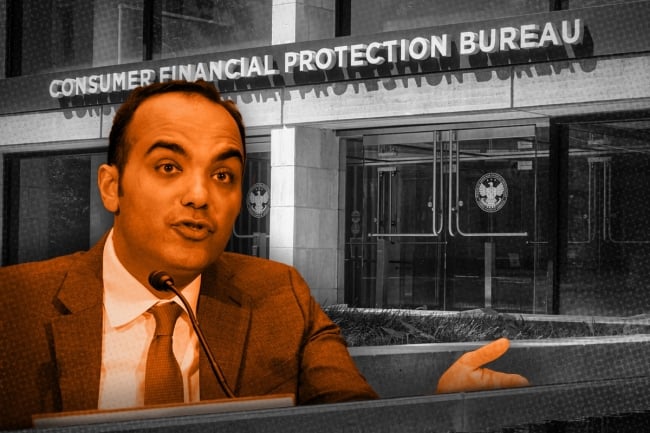You have /5 articles left.
Sign up for a free account or log in.

The Consumer Financial Protection Bureau, led by director Rohit Chopra, this week reached a settlement with Navient after a seven-year legal fight over the company’s student loan management practices.
Photo illustration by Justin Morrison/Inside Higher Ed | David Ake and Michael A. McCoy/Getty Images
Navient, an embattled student loan provider, will pay back $100 million to student loan borrowers after years of accusations that it mismanaged loans and misled borrowers.
The company agreed to pay the restitution, on top of a $20 million penalty, as part of a settlement reached with the Consumer Financial Protection Bureau. It also agreed to accept a permanent ban on managing federal student loans.
The settlement, released Thursday, brings an end to one of the longest-running federal enforcement actions against a major financial firm in U.S. history. The CFPB first sued Navient in January 2017—less than a week before former president Trump’s inauguration—alleging that the company steered borrowers into forbearance, furnished student loan information to credit agencies and “illegally failed borrowers at every stage of repayment.”
CFPB enforcement director Eric Halperin told Inside Higher Ed that the bureau agreed to the settlement rather than bring the case to trial because it would bar Navient from future opportunities to manage federal loans and provide immediate relief to thousands of student borrowers.
“This is the culmination of years of work and a number of efforts to rein in Navient and protect student borrowers,” he said.
Paul Hartwick, Navient’s vice president of corporate communications, wrote in an email to Inside Higher Ed that the company did not admit to any wrongdoing as part of the agreement and that it outsourced the last of its federal loan portfolio earlier this year.
“This agreement puts these decade-old issues behind us,” Hartwick wrote. “While we do not agree with the CFPB’s allegations, this resolution is consistent with our go-forward activities and is an important positive milestone in our transformation of the company.”
It’s not Navient’s first time paying to settle government claims of wrongdoing. In 2014, when it was still a subdivision of Sallie Mae, Navient paid $97 million after the Department of Justice accused it of violating a federal cap on interest rates for military service members. And in 2022, it settled lawsuits brought by 39 states for $1.85 billion; $1.7 billion went toward canceling outstanding loan payments from borrowers.
“For years, Navient’s top executives profited handsomely by exploiting students and taxpayers,” CFPB director Rohit Chopra said in a statement Thursday. “By banning the notorious student loan giant from federal student loan servicing and ensuring the winddown of these operations, the CFPB will finally put an end to the years of abuse.”
A Long Time Coming
Navient stopped servicing federal loans in 2021, when it began scaling back its role in the market. But for years Navient serviced 12 million student loans, including six million federal loans. That portfolio made it the largest student loan servicer in the country and an influential player in federal student loan management and policy.
Mike Pierce, executive director and co-founder of the Student Borrower Protection Center, said Thursday’s enforcement action was “unimaginable” when the CFPB first brought its case against Navient in 2017.
“It’s hard to overstate how dominant of a player in the student loan system Navient was at that time … every piece of the student loan system ran through Navient headquarters in Delaware,” he said. “The CFPB made a big bet that you could prosecute a big public company that dominated a market in a way that could actually win a measure of justice for borrowers.”
Pierce said the long-running enforcement effort against Navient has had a chilling effect on profiteering from loan servicers, especially under the Biden administration. Thursday’s settlement, he believes, sets a precedent for even closer scrutiny and stronger compliance measures.
“The market for federal student loan contracting became very concentrated over the past four years,” he said. “Navient got out of the game, and so did others … The companies that are going to be willing to raise their hand and win these big government contracts are going to do so looking over their shoulder, because they know that regulators are watching.”
This year, Navient transferred its remaining student loan portfolio—about 2.4 million loans—to the Higher Education Loan Authority of the State of Missouri, or MOHELA, a nonprofit organization that’s also been the subject of controversy and government scrutiny. Last year the Education Department fined MOHELA $7.2 million for billing errors that led to missed payments, and the American Federation of Teachers sued the servicer in July for allegedly misleading and misinforming borrowers.
The injunctions issued against Navient as part of Thursday’s settlement will apply to the loans now at MOHELA, which Halperin said gives more accountability and protections for borrowers in the future.
Pierce said he anticipates scrutiny to ramp up on MOHELA as Navient’s saga comes to a close. He also believes that private student loan servicers, over whom the CFPB has less regulatory control but significant oversight responsibilities, will be more squarely in regulators’ crosshairs now; Senator Raphael Warnock, a Georgia Democrat, is chairing a hearing on the issue next Tuesday.
Halperin didn’t divulge any details on the CFPB’s current student loan oversight agenda, but he said the bureau plans to continue holding student loan servicers—both federal contractors and private providers—to account.
“Student loan servicing is a market with a lot of risk for consumers, both in federal and private loans, and it will continue to be a focus for the bureau,” Halperin said. “There’s still much more work to do.”





